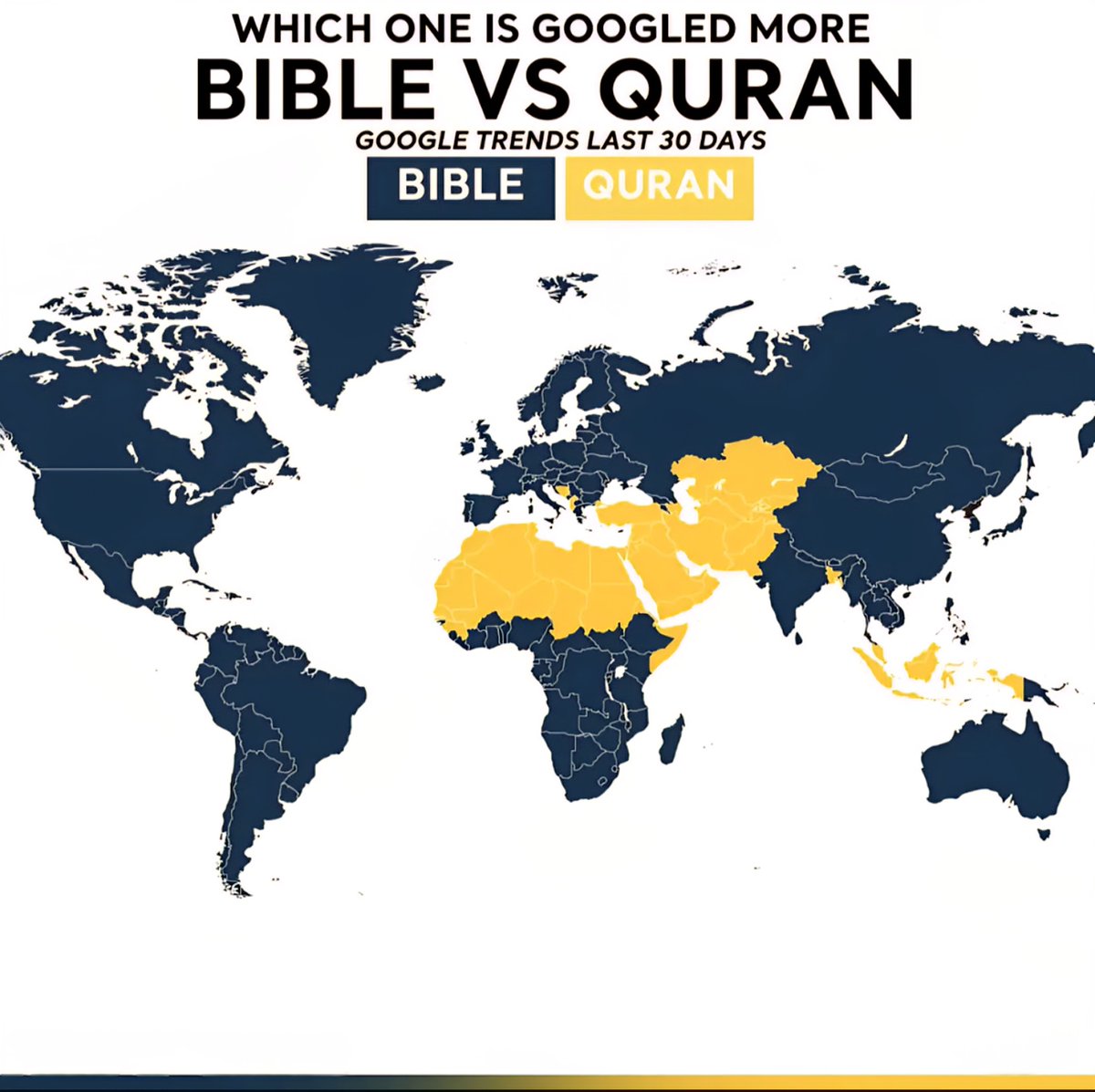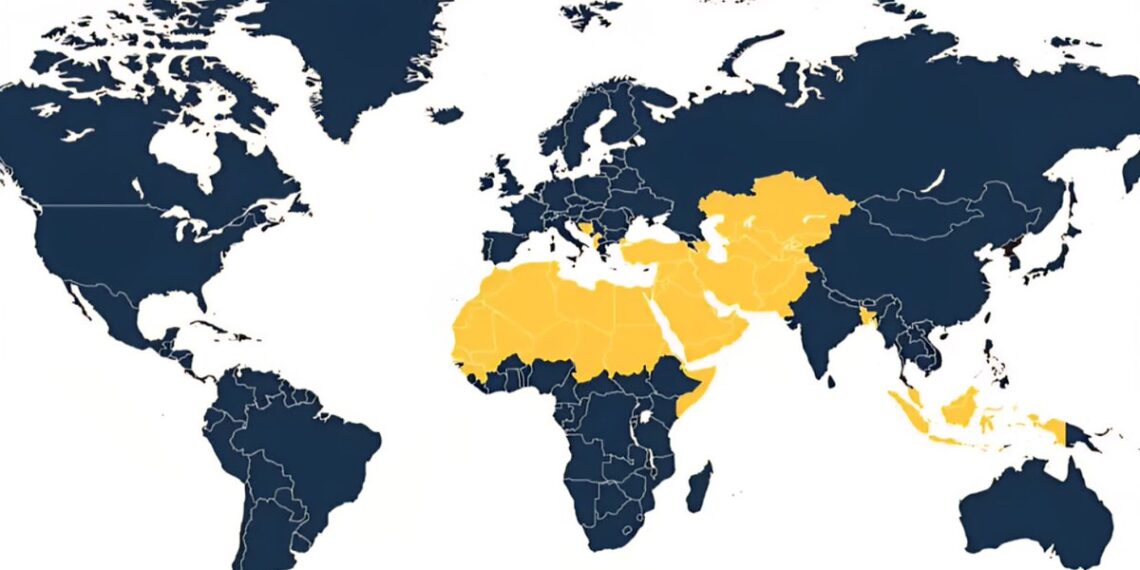Select Language:
Global Interest in Religious Texts: The Search for the Bible and Quran in 2025
In a reflection of evolving global spiritual interests, recent data reveals fascinating insights into how people around the world are engaging with two of the world’s most influential religious texts—the Bible and the Quran. The latest search trend map for 2025 highlights significant patterns in regions of interest, pointing to broader socio-cultural, political, and religious dynamics at play today.

1. The Bible’s Resurgence in Africa and Southeast Asia
The latest search data indicates a sharp increase in interest in the Bible across parts of Africa and Southeast Asia. Countries such as Nigeria, Ethiopia, the Philippines, and Indonesia are showing heightened activity. This trend could be linked to the rapid growth of Christianity in these regions, supported by local initiatives, increased access to digital resources, and religious education programs.
In Nigeria, for example, religious leaders have been leveraging online platforms to connect with younger generations. Similarly, in the Philippines, Christian communities frequently turn to online sources and social media for biblical teachings, leading to a broader curiosity and engagement.
2. The Quran’s Prominence in the Middle East and South Asia
On the other hand, the Quran continues to dominate the digital search landscape in the Middle East and South Asia. Countries like Saudi Arabia, Iran, Pakistan, and Bangladesh display intense interest in their foremost religious text. This heightened engagement may be driven by ongoing regional dialogues around Islamic history, law, and contemporary issues.
The Middle East, with its deep-rooted Islamic traditions, shows consistent interest, but recent geopolitical developments and societal reforms seem to heighten curiosity about Quranic teachings. Meanwhile, in South Asia, the Quran’s prominence is reflected through increased access via mobile devices and educational platforms, indicating a desire for deeper understanding among Muslim communities.
3. North America’s Divergent Patterns
In North America, the search patterns for both texts depict contrasting trends. The United States and Canada show a balanced interest, with particular spikes in searches related to biblical context during holiday seasons and interfaith dialogues. Notably, the Bible’s search interest spikes around major Christian holidays, reflecting cyclical engagement.
Conversely, interest in the Quran remains steady but less pronounced, often associated with academic research, interfaith community initiatives, or cultural interest driven by immigrant communities. The diverse religious landscape in North America accounts for this balanced curiosity, emphasizing a population seeking understanding across faiths.
4. European Curiosity Focuses on Historical and Cultural Contexts
European countries exhibit a nuanced search interest, mainly focused on historical, cultural, and theological aspects. Countries such as the United Kingdom, Germany, and France have peaked in searches relating to biblical archaeology, religious history, and comparative theology. This reflects the region’s rich academic engagement with religious texts, often influenced by university research, public debates, and cultural exploration.
Interestingly, some countries like Sweden and the Netherlands have shown increased interest in Quranic studies, driven by multicultural communities and academic pursuits.
5. Asia-Pacific: A Mix of Traditional Devotion and Modern Curiosity
In the Asia-Pacific region, there’s a diverse tapestry of interest. Countries like Australia and New Zealand show engagement skewed toward both Christian and Muslim texts, driven by community events and educational outreach programs. Meanwhile, in India and Bangladesh, search activity reveals a mixture of traditional religious devotion and curiosity about religious texts amid ongoing social discussions about religious identity and tolerance.
The region’s dynamic religious landscape is shaped by multicultural migration, interfaith initiatives, and a rising emphasis on religious literacy.
6. The Search Interest Across Latin America and Caribbean
Latin American countries such as Brazil, Mexico, and Colombia continue to demonstrate a strong connection to Christian texts, especially the Bible. Search activity peaks during religious festivals and community outreach events, supporting the region’s predominantly Christian demographic.
Meanwhile, Caribbean nations show a more diverse pattern, with interest in both Christian scriptures and Islamic texts, reflecting their multicultural and multi-religious societies.
7. Reflection of Broader Trends
The patterns captured in this 2025 world map of religious searches are more than mere curiosity. They mirror ongoing religious, political, and social transformations across the globe. Increased online engagement indicates a hunger for spiritual understanding, a quest for identity, and a desire for interfaith dialogue in an increasingly interconnected world.
These search trends reveal how digital platforms now serve as powerful tools in shaping and reflecting religious engagement. As societies continue to evolve, so will the ways in which faith and spirituality are explored, understood, and practiced worldwide.
The global community appears to be seeking answers, and these digital footprints reveal more than just curiosity—they showcase the enduring importance of faith in the modern age.






